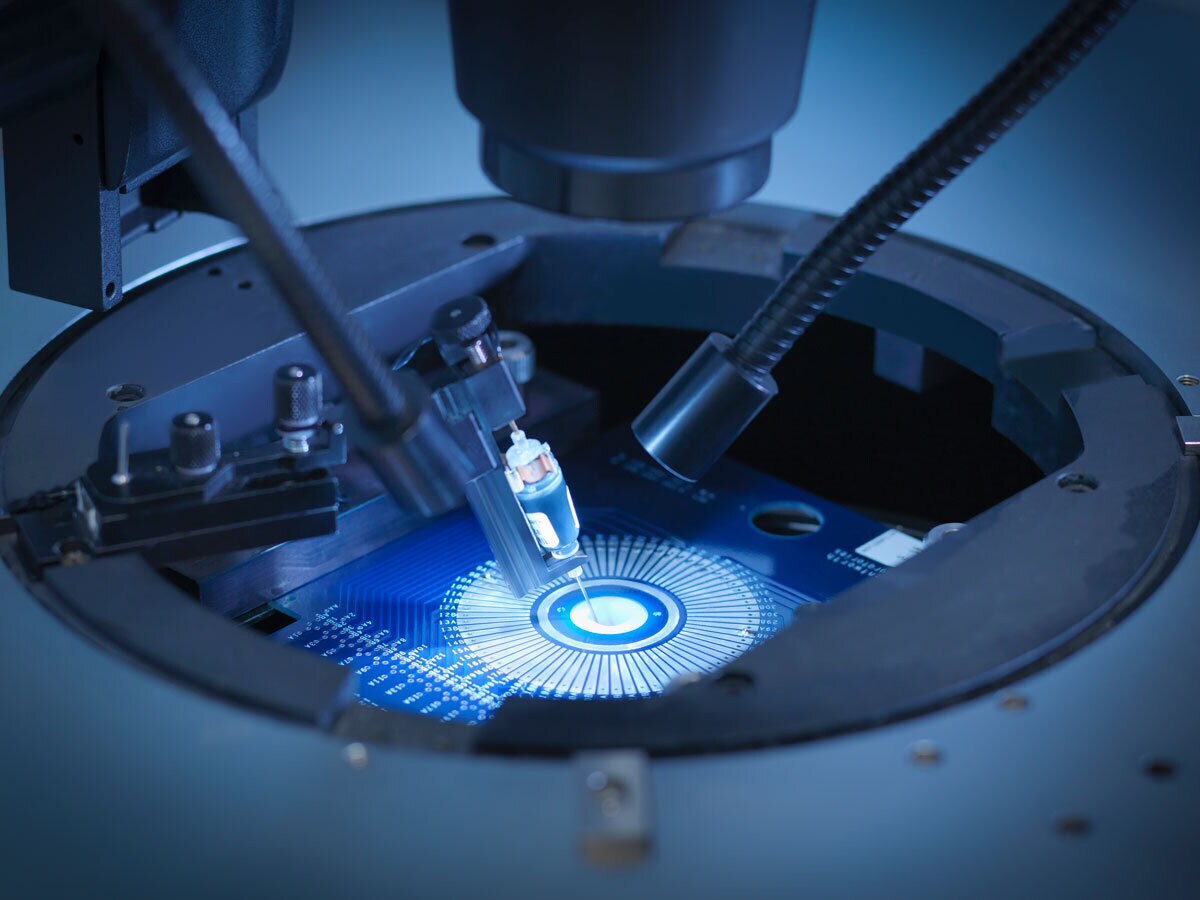Generative artificial intelligence (AI) has dominated the semiconductor conversation this year. But while the technology has transformative potential in this space, there are also opportunities in the automotive and healthcare industries.
- Qualcomm is in talks to acquire Autotalks to improve its V2X technology, used in road safety and traffic management.
- Nvidia’s share price could be impacted if the generative AI bubble pops, warns WisdomTree.
- The Strive US Semiconductor ETF is up 38% year-to-date
Ahead of Nvidia’s [NVDA] earnings on Wednesday, the chipmaking giant has apparently sold thousands of its high-performance graphic processing units (GPUs) to Saudi Arabia and the United Arab Emirates (UAE). GPUs are used to build and power AI applications.
“The UAE has made a decision that it wants to … own and control its own computational power and talent, have their own platforms and not be dependent on the Chinese or the Americans,” a source told the Financial Times last week.
Nvidia’s A100 and H100 chips have been selling like hot cakes. Such is the demand, lead times have got longer and Taiwan Semiconductor Manufacturing Company (TSMC) [TSM], which helps manufacture them, is seeing a capacity shortage. While it is doubling its high-end packing capacity, the impact of this shortage will be felt for the rest of the year.
“Three months ago, we were probably more optimistic, but now [we’re] not. Also, for example, China economy’s recovery is actually weaker than we thought. And so, the end market demand actually did not grow as we expected,” commented TSMC CEO CC Wei on the second quarter (Q2) 2023 earnings call in July.
Despite very high demand for AI processors, it won’t be enough to offset this weakness, Wei added.
While generative AI has shaped the chipmaking narrative this year, there are other use cases driving the semiconductor theme.
Opportunities Beyond AI
US chip giant Qualcomm [QCOM] is a major supplier of vehicle-to-everything (V2X) chips, and is currently in talks to acquire Israeli firm Autotalks. V2X can help improve traffic management and road safety, as well as helping to reduce carbon emissions.
The deal will require EU approval, however, to “ensure that customers such as original equipment manufacturers or infrastructure managers retain access to V2X technology at competitive prices and conditions”, the European Commission said in a statement issued last week.
Elsewhere, British chip designer Arm, which filed for an IPO on Monday, is helping to power the transformation of Saudi Arabia's healthcare system. In tandem with clinical stage biotech Nano Cures, Arm will establish a fabrication plant to manufacture logic chips, while an advanced microprocessor design centre is expected to be established in the Kingdom’s smart city, Neom.
Infineon Technology’s [IFX.DE] chips are used by a range of industries, including automotive, healthcare and manufacturing, and can be found in IoT devices. The German semiconductor maker’s goal is “to be the leader in power systems”, according to CEO Jochen Hanebeck. “With our strong portfolio geared at the long-term trends of decarbonisation and digitalisation, we are addressing the right structural themes,” Hanebeck said on the Q3 2023 earnings call earlier this month.
Infineon is also currently leading the EU-wide Listen2Future project, launched in February, which will develop ultrasound sensors that can be used in the medical field, such as for detecting heart disease.
Prioritising Medtech for Chip Supplies
Medical devices can transform the early diagnosis, treatment and monitoring of health conditions. While medical devices account for less than 1% of the total chip market, it’s vital that the medtech sector benefits from a ramp up in semiconductor manufacturing, because a shortage poses a risk to patient health.
To mark the first anniversary of the US CHIPS and Science Act, which was signed on 9 August last year, the medical device trade body in the US, AdvaMed, has reminded President Joe Biden’s government that medtech should not be forgotten about when it comes to securing supplies of chips manufactured domestically.
The trade body has also published a strategy outlining six priorities to help the US beef up its supply chain resilience. This includes a long-term prioritisation of semiconductor chips and critical components for medtech devices, and stresses the need for public–private partnerships.
AI Chips Vital to the Future of Healthcare
As devices get smarter, they’re going to require more advanced semiconductors.
Nvidia has teamed up with Medtronic [MDT] to embed its AI healthcare platform, Clara, into endoscopy devices with the aim of improving clinical decision-making, patient care and outcomes.
“We believe that collaborating with AI companies and developers like Nvidia … is essential to driving innovation within the medical device industry,” said Giovanni Di
Napoli, President of Gastrointestinal Business at Medtronic, in a press release back in March.
The hype around generative AI has seen the Nvidia share price surge 221% year-to-date. Christopher Gannatti, Global Head of Research at WisdomTree, puts this runaway success down to a combination of “great messaging, great marketing, great vision and amazing technology”.
Generative AI’s Bubble Fears
Nevertheless, according to Gannatti, investors still need to be wary. The generative AI bubble could burst at any time, which could lead to the Nvidia share price pulling back sharply.
“We have to think — what types of things can [Nvidia] potentially announce to create the possibility of a positive surprise from here? High investor expectations is one of the toughest hurdles for companies to overcome,” Gannatti wrote in a blog post published 10 August.
A report from Gartner released last week suggests that generative AI has now hit the “peak of inflated expectations” in its hype cycle, and is expected to have a transformational benefit over the next two to five years. This stage is characterised by scores of success stories, but potentially just as many failures.
How to Invest in Semiconductor Stocks
ETFs, or exchange-traded funds, offer an economical and diversified way to invest in a variety of stocks within a particular theme.
Funds in Focus: the Strive US Semiconductor ETF
The iShares Semiconductor ETF [SOXX] holds Nvidia and Qualcomm. The fund is weighted 79.58% towards semiconductors and 20.23% towards semiconductor equipment, as of 18 August. The fund is up 42.7% year-to-date.
The Strive US Semiconductor ETF [SHOC] also holds Nvidia and Qualcomm. As of 30 June, semiconductors accounted for 91.5% of the portfolio, while industrials and energy had allocations of 4.3% and 4.1% respectively. The fund is up 37.9% year-to-date.
The Global X Artificial Intelligence and Technology ETF [AIQ] holds Nvidia, Qualcomm and Infineon. As of 31 July, the information technology sector accounts for 62.2% of the portfolio, while communication services and consumer discretionary have allocations of 14% and 12.2% respectively. Industrials, financials and healthcare have single-digit weightings. The fund is up 35.7% year-to-date.
Disclaimer Past performance is not a reliable indicator of future results.
CMC Markets is an execution-only service provider. The material (whether or not it states any opinions) is for general information purposes only, and does not take into account your personal circumstances or objectives. Nothing in this material is (or should be considered to be) financial, investment or other advice on which reliance should be placed. No opinion given in the material constitutes a recommendation by CMC Markets or the author that any particular investment, security, transaction or investment strategy is suitable for any specific person.
The material has not been prepared in accordance with legal requirements designed to promote the independence of investment research. Although we are not specifically prevented from dealing before providing this material, we do not seek to take advantage of the material prior to its dissemination.
CMC Markets does not endorse or offer opinion on the trading strategies used by the author. Their trading strategies do not guarantee any return and CMC Markets shall not be held responsible for any loss that you may incur, either directly or indirectly, arising from any investment based on any information contained herein.
*Tax treatment depends on individual circumstances and can change or may differ in a jurisdiction other than the UK.
Continue reading for FREE
- Includes free newsletter updates, unsubscribe anytime. Privacy policy






